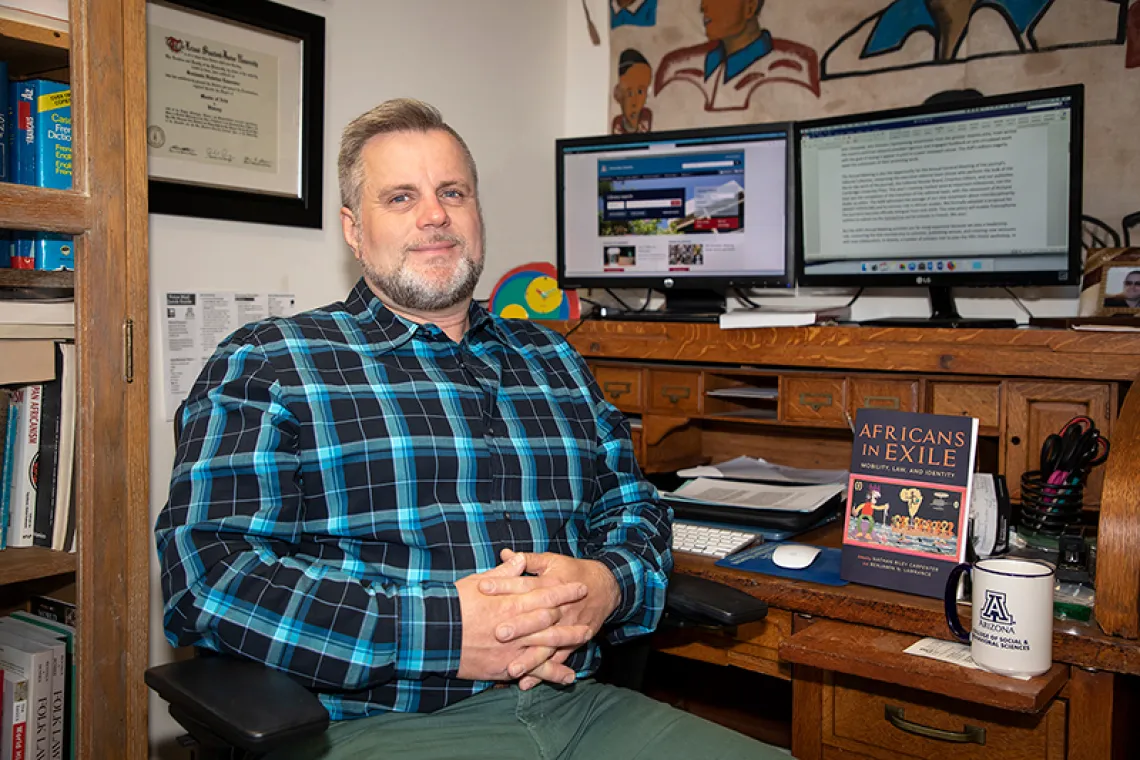How Africans are Changing Asylum Law
Legal historian Benjamin N. Lawrance, who is the new editor-in-chief of African Studies Review, is researching the changing nature of asylum law using the oral histories collected from his years as an expert witness in West African asylum cases.

Benjamin Lawrence
Benjamin N. Lawrance, who joined the University of Arizona Department of History in 2017, is a legal historian who works in Africa, a continent he visits at least once a year, and with West African migrants.
He also has affiliate faculty positions with the Africana Studies Program, Human Rights Practice Program, and the Center for Regional Food Studies.
Lawrance has recently been named the editor-in-chief of the African Studies Review, the flagship journal of the African Studies Association. Being the editor, while a time-intensive endeavor, brings prestige to the UA and allows Lawrance to gain an “eagle-eye view” of the field. “I get to see what is pressing and emerging in terms of topics and themes of study.”
Lawrance’s research explores mobility, labor, and exploitation, and he has written about historical and contemporary slavery, human trafficking, cuisine and globalization, human rights and asylum policies. He has received fellowships from the American Council of Learned Societies, the National Endowment for the Humanities, and several residential awards at renowned U.S. institutions, such as Yale University and the University of Notre Dame.
Lawrance has also served as an expert witness for over 400 petitions by West African migrants requesting asylum in the U.S. and many other countries.
While a graduate student at Stanford, Lawrance wrote his dissertation on the West African country of Togo, where he lived for more than a year doing research. “During my time there, I was arrested, car jacked, and had a gun held against my head. It is a pretty scary place.”
In 2002, he started fielding email inquiries from lawyers asking if he could help them represent their Togolese clients seeking asylum for political persecution.
“I was struck by the realization that my study was useful in a way that I had not conceived of,” Lawrance said. “I was able to interpret the narratives of these people in ways that immigration judges could made sense of.
“Early on it started out as a way of repaying some of the social debt I had accumulated as a graduate student,” Lawrance said.
But over time, Lawrance began to consider these asylum cases as a new way to do research. With the asylum seekers’ permissions, Lawrance collected these stories as part of the oral history of Africa.
“If you are trying to write a contemporary history of the last 50 years of Togo, the reality is that you can’t just go to Togo and start interviewing people about political persecution and torture,” Lawrance said. “They are not going to talk to you. The only people who will talk have escaped and are living abroad. So I started to realize that his huge archive of personal stories was effectively a different form of asylum archive.”
Lawrance’s most recent book, co-edited with former graduate student Nathan Riley Carpenter, is titled Africans in Exile: Mobility, Law, and Identity (2018).
His chapter in that book is titled “A Nation Abroad: Desire and Authenticity in Togolese Political Dissidence.” He describes how the narratives from political dissidents are both “richly instructive and deeply problematic” for reconstructing sociopolitical life under former Togo ruler Etienne Gnassingbé Eyadéma.
Other recent books co-edited by Lawrance include Citizenship in Question: Evidentiary Birthright and Statelessness (2017) and Marriage by Force? Contestation over Consent and Coercion in Africa (2016).
Lawrance is currently working on a book that recounts the contemporary historical experience of Africans who flee torture, political violence and persecution. He is trying to navigate what is happening to asylum law as a result of new African asylum claims.
Lawrance says that Africans represent a relatively small number of asylum seekers – the biggest are from South and Central America and China. But they are increasing in number and they are changing the way immigration officials think about asylum because they are asking for asylum for new reasons, such as witchcraft, forced marriage, homophobic violence and female genital cutting.
“These represent real challenges for immigration decision makers because they need to understand how it is that something that is being described as a social or cultural practice could also possibly rise to the level of persecution and be protected under the refugee convention,” Lawrance said.
Lawrance added, “I am interested in the family and the intimate space as a site for asylum. But I need to tell the story so it not just a story of individuals but it represents a larger group of people.”
Misinformation about refugee and asylum issues is prevalent, Lawrence said. Contrary to popular perceptions, the vast majority of people seeking asylum have entered the country legally. “Claiming asylum is a human right,” Lawrence said.
“I think now, more than ever, it is important to pay attention to what forces people to flee the country they were born and grew up in. To move across the world in search of a better life is a profound statement about the conditions in which you live, and it is also at the core of the foundation narrative of our United States,” he said.

